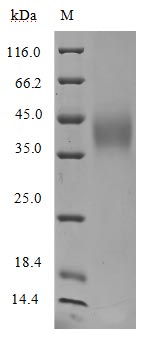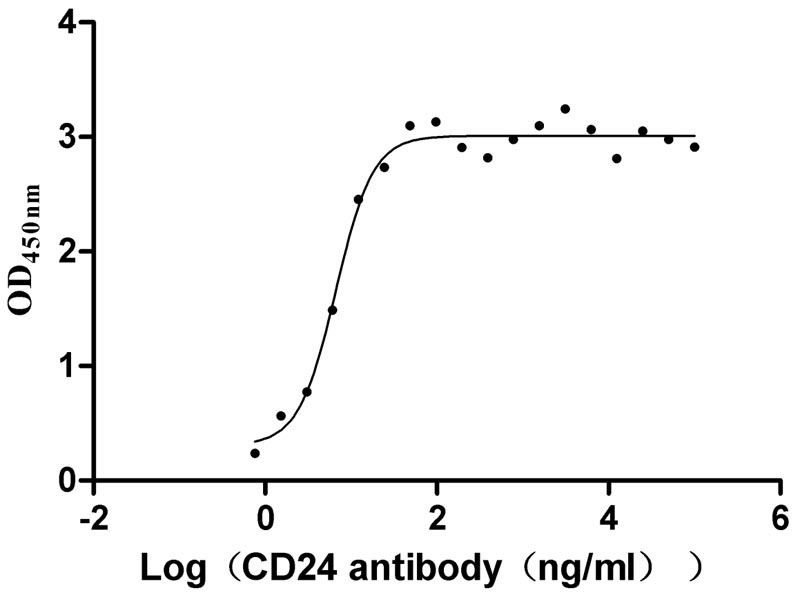The recombinant human CD24 protein is produced in mammalian cells through nanoparticle technology. The gene segment encoding the 27-59aa region of the human CD24 is co-cloned into a plasmid with an N-terminal 6xHis-tag gene. The recombinant plasmid is combined with the nanoparticles to form complexes, which are transfected into mammalian cells. After transfection, the cells will synthesize CD24 protein under the action of their endogenous translation mechanism. The cells are lysed to release the CD24 proteins, which are purified by affinity chromatography from the cell lysate. The purity of the recombinant CD24 protein is over 95% as measured by SDS-PAGE. The LAL assay shows its endotoxin levels are less than 1.0 EU/μg. ELISA reveals its binding to the CD24 recombinant monoclonal antibody with an EC50 of 5.409-8.219 ng/mL.
The human CD24 protein is a small, heavily glycosylated glycosylphosphatidylinositol (GPI)-anchored cell surface protein [1]. It has been identified as a ligand for P-selectin, an adhesion receptor on activated platelets and endothelial cells [1][2][3][4].
CD24 plays a significant role in tumor metastasis and invasion. During metastasis, tumor cells can bind to platelets or endothelial cells through the interaction between CD24 and P-selectin, allowing them to escape into the bloodstream and increase their metastatic potential [2][3][4][5]. Studies have shown that CD24 expression is associated with the metastatic phenotype in various malignant tumors, including hepatocellular carcinoma, lung cancer, colorectal cancer, and bladder cancer [6][7][8].
In addition to its role in metastasis, CD24 has also been linked to other cellular processes in cancer, such as proliferation, survival, and drug resistance. CD24 can activate integrin function, which is important for cell-cell and cell-matrix interactions, and can also modulate signaling pathways like the Ral GTPase and NF-κB pathways [9][10][11]. Overexpression of CD24 has been related to poor prognosis in various cancer types, including hepatocellular carcinoma, bladder cancer, and breast cancer [6][7][8].
Furthermore, CD24 has been identified as a potential therapeutic target in cancer. Targeting CD24 with antibodies or other approaches has been shown to suppress tumor growth and influence the cytokine milieu in experimental models of cancer [12]. Additionally, CD24 has been implicated in mediating immune tolerance at the fetal-maternal boundary and in regulating the immune response to tissue damage [13][14].
References:
[1] J. Zheng, Y. Li, J. Yang, Q. Liu, M. Shi, R. Zhang, et al. Ndrg2 inhibits hepatocellular carcinoma adhesion, migration and invasion by regulating cd24 expression, BMC Cancer, vol. 11, no. 1, 2011. https://doi.org/10.1186/1471-2407-11-251
[2] H. Okabe, K. Aoki, S. Yogosawa, M. Saito, K. Marumo, & K. Yoshida. Downregulation of cd24 suppresses bone metastasis of lung cancer, Cancer Science, vol. 109, no. 1, p. 112-120, 2017. https://doi.org/10.1111/cas.13435
[3] W. Weichert, C. Denkert, M. Burkhardt, T. Gansukh, J. Bellach, P. Altevogt, et al. Cytoplasmic cd24 expression in colorectal cancer independently correlates with shortened patient survival, Clinical Cancer Research, vol. 11, no. 18, p. 6574-6581, 2005. https://doi.org/10.1158/1078-0432.ccr-05-0606
[4] C. Liu, S. Zheng, H. Shen, K. Xu, J. Chen, H. Li, et al. Clinical significance of cd24 as a predictor of bladder cancer recurrence, Oncology Letters, vol. 6, no. 1, p. 96-100, 2013. https://doi.org/10.3892/ol.2013.1357
[5] A. Moulla, D. Miliaras, A. Sioga, A. Kaidoglou, & L. Economou. The immunohistochemical expression of cd24 and cd171 adhesion molecules in borderline ovarian tumors, Polish Journal of Pathology, vol. 3, p. 180-184, 2013. https://doi.org/10.5114/pjp.2013.38135
[6] X. Yang, Y. Xu, B. Yu, J. Zhou, J. Li, S. Qiu, et al. Cd24 is a novel predictor for poor prognosis of hepatocellular carcinoma after surgery, Clinical Cancer Research, vol. 15, no. 17, p. 5518-5527, 2009. https://doi.org/10.1158/1078-0432.ccr-09-0151
[7] J. Overdevest, S. Thomas, G. Kristiansen, D. Hansel, S. Smith, & D. Theodorescu. Cd24 offers a therapeutic target for control of bladder cancer metastasis based on a requirement for lung colonization, Cancer Research, vol. 71, no. 11, p. 3802-3811, 2011. https://doi.org/10.1158/0008-5472.can-11-0519
[8] M. Kwon, J. Han, J. Seo, K. Song, H. Jeong, J. Choi, et al. Cd24 overexpression is associated with poor prognosis in luminal a and triple-negative breast cancer, Plos One, vol. 10, no. 10, p. e0139112, 2015. https://doi.org/10.1371/journal.pone.0139112
[9] S. Smith, G. Oxford, Z. Wu, M. Nitz, M. Conaway, H. Frierson, et al. The metastasis-associated gene cd24 is regulated by ral gtpase and is a mediator of cell proliferation and survival in human cancer, Cancer Research, vol. 66, no. 4, p. 1917-1922, 2006. https://doi.org/10.1158/0008-5472.can-05-3855
[10] P. Baumann, W. Thiele, N. Cremers, S. Muppala, J. Krachulec, M. Diefenbacher, et al. Cd24 interacts with and promotes the activity of c-src within lipid rafts in breast cancer cells, thereby increasing integrin-dependent adhesion, Cellular and Molecular Life Sciences, vol. 69, no. 3, p. 435-448, 2011. https://doi.org/10.1007/s00018-011-0756-9
[11] P. Zhang, G. Zhu, X. Huo, S. Liao, J. He, Y. Long, et al. Cd24 promotes the proliferation and inhibits the apoptosis of cervical cancer cells in vitro, Oncology Reports, vol. 35, no. 3, p. 1593-1601, 2015. https://doi.org/10.3892/or.2015.4521
[12] A. Salnikov, N. Bretz, C. Perne, J. Hazin, S. Keller, M. Fogel, et al. Antibody targeting of cd24 efficiently retards growth and influences cytokine milieu in experimental carcinomas, British Journal of Cancer, vol. 108, no. 7, p. 1449-1459, 2013. https://doi.org/10.1038/bjc.2013.102
[13] L. Qiao, H. Li, Y. Zhang, D. Shen, P. Liu, & Y. Che. Cd24 contributes to treatment effect in abc-dlbcl patients with r-chop resistance, Pharmacogenomics and Personalized Medicine, vol. Volume 14, p. 591-599, 2021. https://doi.org/10.2147/pgpm.s310816
[14] X. Wu, P. Srinivasan, M. Basu, T. Zimmerman, S. Li, Y. Wang, et al. Cd24-fc suppression of immune related adverse events in a therapeutic cancer vaccine model of murine neuroblastoma, Frontiers in Immunology, vol. 14, 2023. https://doi.org/10.3389/fimmu.2023.1176370








